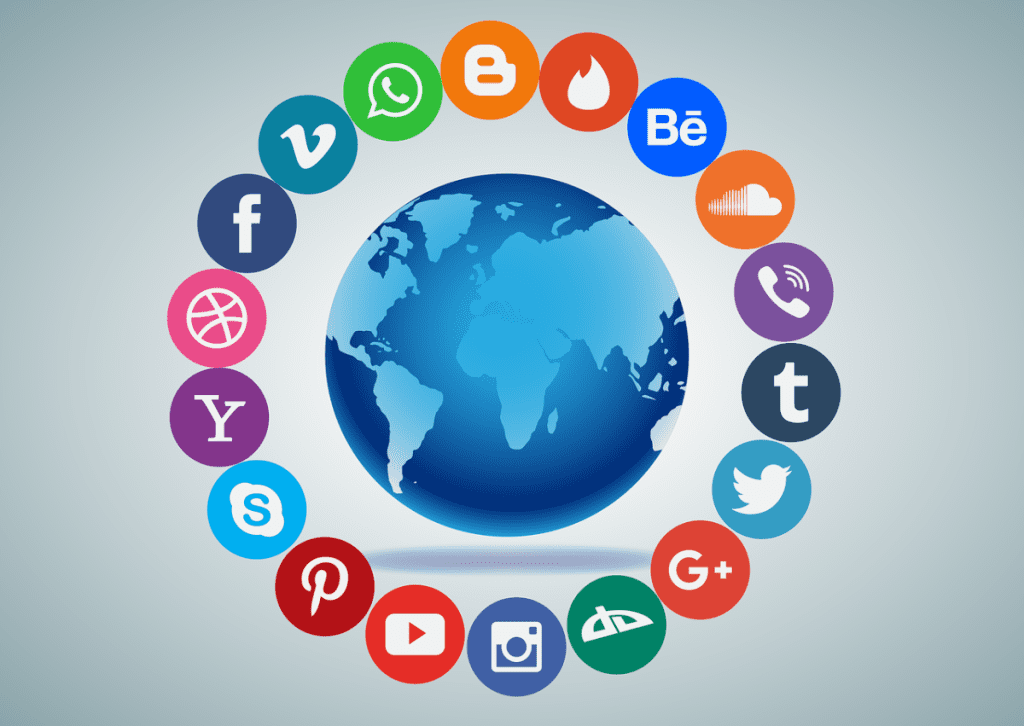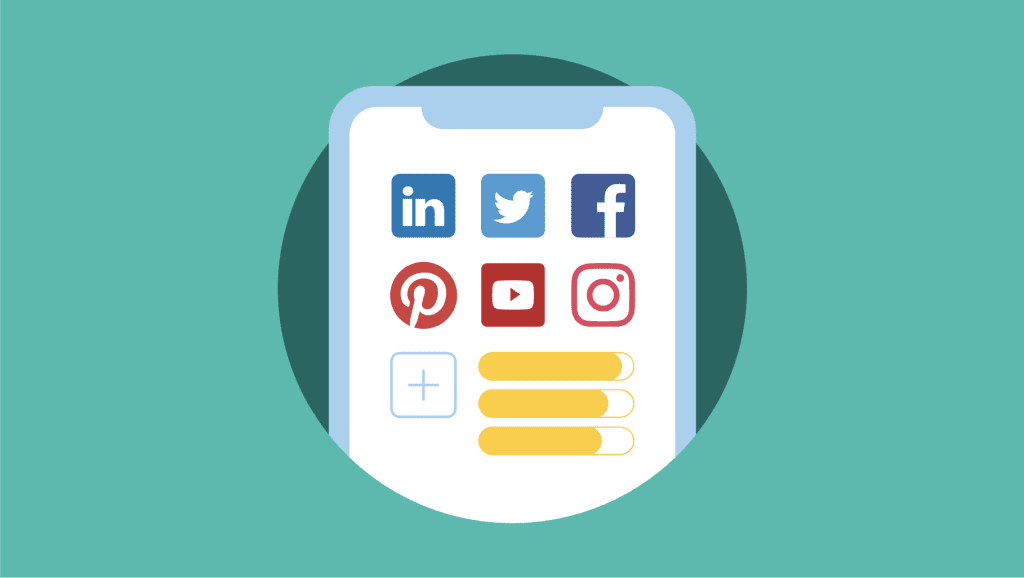Social media refers to websites and applications on computers or websites that allow users to create and share content or participate in social networking. Social media platforms provide users with a variety of features such as messaging, commenting, sharing, and tagging. These platforms can be used for various purposes such as communication, entertainment, news dissemination, marketing, and activism. Some examples of popular social media platforms include Facebook, Instagram, Twitter, LinkedIn, TikTok, and YouTube. Social media has transformed the way people communicate and interact with each other, and it has also had a significant impact on various aspects of society, including politics, business, and culture.
Definition of social media

Social media refers to a group of internet-based platforms and tools that enable individuals, businesses, organizations, and communities to create, share, and exchange information, ideas, and multimedia content with each other. These platforms provide a variety of features such as messaging, commenting, sharing, and tagging, that allow users to communicate and interact with each other in real-time or asynchronously. The content shared on social media can include text, images, videos, and audio, and it can be viewed, commented on, and shared by other users. Social media has become an important part of modern communication and has had a significant impact on various aspects of society, including culture, politics, business, and personal relationships.
Most popular social networking services

The following is a list of the most popular social networking services based on the number of active users as of January 2022 per Statista.
| Network Name | Number of Users(in millions) | Country of Origin |
|---|---|---|
| 2,960 | United States | |
| YouTube | 2,562 | United States |
| 2,000 | United States | |
| 2,000 | United States | |
| 1,263 | China | |
| TikTok | 1,000 | China |
| Facebook Messenger | 988 | United States |
| Douyin | 600 | China |
| Sina Weibo | 573 | China |
| Kuaishou | 573 | China |
| Snapchat | 555 | United States |
| Qzone | 553 | China |
| Telegram | 550 | United States |
| 538 | China | |
| Vk | 500 | Russia |
| 444 | United States | |
| 430 | United States | |
| 424 | United States | |
| Quora | 300 | United States |
| 238 | United States | |
| Discord | 150 | United States |
| Twitch | 140 | United States |
| Tumblr | 135 | United States |
| Mastodon | 1.35 | Decentralized |
History of social media
The roots of social media can be traced back to the early days of the internet in the 1970s and 1980s. However, the modern era of social media began in the late 1990s and early 2000s with the rise of platforms such as Six Degrees and Friendster, which allowed users to create profiles and connect with other users.
In 2004, Facebook was launched, and it quickly became one of the most popular social networking platforms, initially for college students, and later for the general public. In the same year, a micro-blogging platform called Twitter was also launched, which allowed users to share short messages or “tweets” with their followers.
Since then, the number and variety of social media platforms have exploded, with platforms such as Instagram, LinkedIn, Snapchat, and TikTok gaining popularity. Today, social media is an integral part of our lives, with billions of people around the world using these platforms to connect with each other, share content, and engage in various activities.
Social media has had a significant impact on society, changing the way people communicate and interact with each other, and influencing various aspects of culture, politics, and business. However, it has also been criticized for issues such as privacy concerns, cyberbullying, and the spread of misinformation.
Timeline of social media (1973–2023)

| Year | Platform | Developer/Founder |
|---|---|---|
| 1973 | Talkomatic | Dave Wooly, Douglas Brown |
| 1997 | SixDegrees.com | Andrew Weinreich |
| 1997 | AOL Instant Messenger | Barry Appelman, Eric Bosco, Jerry Harris |
| 1999 | Yahoo Messenger | Jerry Yang, David Filo |
| 1999 | MSN Messenger | Microsoft |
| 1999 | LiveJournal | Brad Fitzpatrick |
| 2002 | Friendster | Jonathan Abrams |
| 2003 | Reid Hoffman | |
| 2003 | Myspace | Thomas Anderson |
| 2003 | Skype | Microsoft |
| 2004 | Mark Zuckerberg | |
| 2004 | Orkut | Orkut Büyükkökten |
| 2005 | YouTube | Steve Chen, Chad Hurley, Jawed Karim |
| 2005 | Aaron Swartz | |
| 2006 | Jack Dorsey | |
| 2006 | VK | Pavel Durov |
| 2008 | Nextdoor | Nirav Tolia, Sarah Leary, Prakash Janakiraman, David Wiesen |
| 2009 | Brian Acton, Jan Koum | |
| 2010 | Ben Silbermann | |
| 2010 | Kevin Systrom | |
| 2011 | Snapchat | Evan Spiegel |
| 2011 | Google+ | Bradley Horowitz |
| 2011 | Twitch | Justin Kan |
| 2011 | Allen Zhang | |
| 2012 | Tinder | Sean Rad |
| 2013 | Google Hangouts | Larry Page, Sergey Brin |
| 2014 | musical.ly | Alex Zhu, Luyu Yang |
| 2015 | Discord | Jason Citron, Stan Vishnevskiy |
| 2017 | TikTok | Zhang Yiming |
| 2020 | Clubhouse | Paul Davison, Rohan Seth |
What are the benefits of social media?
Social media provides several benefits, including the following:
- User visibility. Social platforms let people easily communicate and exchange ideas or content.
- Business and product marketing. These platforms enable businesses to quickly publicize their products and services to a broad audience. Businesses can also use social media to maintain a following and test new markets. In some cases, the content created on social media is the product.
- Audience building. Social media helps entrepreneurs and artists build an audience for their work. In some cases, social media has eliminated the need for a distributor, because anyone can upload their content and transact business online. For example, an amateur musician can post a song on Facebook, get instant visibility among their network of friends, who in turn share it on their networks.
What are the challenges of social media?
Social media can also pose challenges to individual users, in the following ways:
- Mental health issues. Overuse of social apps can result in burnout, social media addiction and other issues.
- Polarization. Individuals can end up in filter bubbles. They create the illusion of open discourse when the user is actually sequestered in an algorithmically generated online community.
- Disinformation. Polarized environments foster the spread of disinformation where the perpetrator’s intent is to deceive others with false information.
Businesses face similar and unique social media challenges.
- Offensive posts. Conversations on intranets and enterprise collaboration tools can veer off into non-work-related subjects. When that happens, there is potential for co-workers to disagree or be offended. Controlling such conversations and filtering for offensive content can be difficult.
- Security and retention. Traditional data security and retention policies may not work with the features available in collaboration tools. This can raise security risks and compliance issues that companies must deal with.
- Productivity concerns. Social interaction, whether online or in person, is distracting and can affect employees’ productivity.
- Computer – KnowledgeSthali

